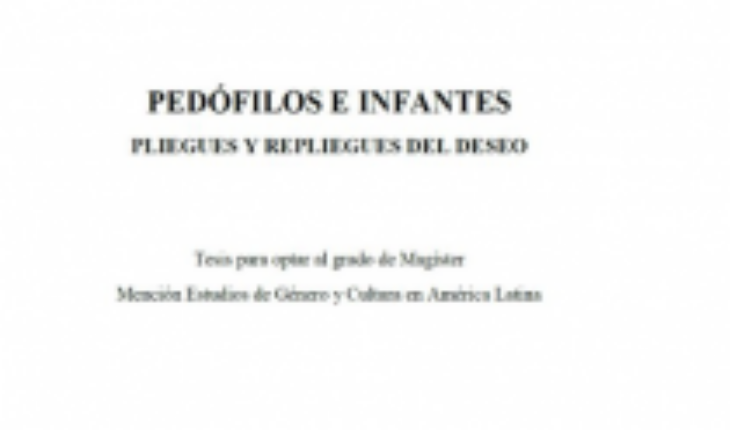The controversy that has arisen around the theses accused of apology for pedophilia has gained a series of edges that will require delayed analysis and very varied approaches if it is to live up to what the question raises. Thus, to address the issue with rigor and prudence, the first thing is to note that it is not one, but a constellation of problems that, although intertwined, each one keeps a specific weight.
Among the many lateral issues that have been strongly manifested in this episode, there is the almost zero possibility of examining the issue beyond the rules that print a certain informative media scheme. With this somewhat rudimentary formula I mean the temporality and schematization imposed by the communicative regime formed by social networks, youtube channels and journalistic notes that shape and support something like “public debate”.
The dizzying pace in which communication is inscribed seems to insist that every event cannot be reviewed for more than 5 minutes and that history – no longer recent but instantaneous – has to be compressed to a month maximum. In this way, it seems that everything that remains outside that parenthesis is considered buried, archived and therefore tied to a definitive judgment or a finalized interpretation. The verdicts are authoritatively folded to the past and ideas, canceling any possible re-reading. In the same way, any argument or analysis that exceeds 5 or 10 minutes (I think of Youtube and Tik-tok capsules, Instagram stories and even memes) or the 280 characters of Twitter, appears as a secondary complement to an exclusive and simple synthetic idea: “a lot of text” is even an accusation of this grammar in which it is accused of being a turnaround, unnecessary, imprecise or ambiguous to those who develop a somewhat more lengthy writing: someone or something that “does not go to the point”.
By the way, this is the grammar and format in which “public opinion”, political debate and the presentation of events take place today. In the narrative that shapes our environment, caricature-like simplifications abound, reductions that do not admit nuances, dichotomies and sharp radicalizations. The informed citizen then assumes that special relationship with communication, with facts, with novelty, with the world.
It is not surprising then that it is the university – thought in general – that in a certain way is harassed and besieged by this tempo and by this rhythmic regime of communication. In the case of the theses of the University of Chile, some of these interventions have demanded at point-blank range that the university appear in the terms of that precise communicational rationality: public opinion would only admit those times, those formats and that conciseness. It is no coincidence that the circulation of this controversy was born on Twitter and has been replicated virally through networks to later be finalized in its sense by influencers, youtubers, journalistic notes and disseminators that function as instances of veridiction. It is those who seem to have the privilege of harvesting the dispersion and leading it to an explanation whose prerogative is to inform and define what has happened.
From this perspective, this controversy drags something more than “a fact” to which one must respond. It also seems to refer to two regimes of communication and presentation of ideas housed in radically different conceptions. Without diminishing the seriousness of the potential damages of the substantiation of Leonardo Arce’s thesis, the contested document consists of a letter of more than 200 pages and just over 72,000 words. In its form, it does not in any case have a claim of brevity or synthesis. Nor is it accompanied by a schematic that communicates its hypotheses in an easily digestible format. Its structure responds, to a greater or lesser extent, to what characterizes any thesis document.
Already with this consideration one could ask about the meaning of the “apologetic”. If by apology is meant merely the argument that points to a defense or an exaltation, it is possible that a thesis or an academic text can be qualified as such. But then we must face the paradox that arises if we extend this character to all the production of knowledge that is housed in universities: we would thus have to be suspicious of all repositories that include editions. of Mein Kampf, of Hagenbeck’s exhibitions or of Sade’s writings, among many other cultural registers that can be complex for our moral codes: Are libraries complicit in apology because they have copies that are part of or that testify to the barbarity of our culture?
However, if we look at a pragmatic dimension ─very present in the current communicational sphere─, an effective apology would be far from circulating in a thesis format. That is, if apologetic is also thought of as the will to convince and disseminate the ideas that are intended to be sustained, the present shows us that the preponderant informative media scheme (that of networks and digital communications) has much more performance and coverage.
There are certainly some questions: Is there then an apologetic will in the author of a thesis? And in this specific case: Do Leonardo Arce’s statements have a correlate in another format of dissemination and propaganda more typical of a community manager than of a postgraduate thesis? Was it pure incompetence that his ideas took six years to become popular? However, it seems that this controversy rests on an obvious assimilation between heterogeneous and opposed communicative temporalities.
But even more: this same contrast can be taken to the background that surrounds this episode: the scope and performance of the production of knowledge of the humanities, thought in its university format. Far from the world of efficiency, productivity and even evidence, the fruit of the humanities often seems to be a kind of luxury that societies threatened by necessity should not afford. On the contrary, from the perhaps most romantic perspective of an enlightened ambition, its virtue is precisely to suspend the rhythm of production and efficiency to open a slow space to investigate without the parameters imposed by both the current and the urgent: to investigate with essay, with stumbling, with errors, but also with successes and imagination. In that register, the indocility of the useless question would then be the sign of its strength and not of its weakness.
Between these two temporalities and these two ways of communicating ideas, I would be inclined that the university should embrace the latter. And in this way, if there is a space to ask, analyze and discuss what can be aberrant and hostile to us in all its complexity, it is precisely the one in which ideas, words and things intertwine and converge without haste and without pretension to spread under the rules of trending topic and viral coverage. If prohibition is part of the university, then a fragment of the thinkable is condemned to non-existence. Caesar non est supra grammaticos already recalled Kant advocating the non-interference of authority in the genuine desire to enlighten oneself. In passing, it also indicated that the sovereign had a delimited scope of competences and that there were processes that did not respond to his mandate. If it is not in the almost extinct but longed-for district of academics, what would be that place where questions and analysis ─well or badly formulated; That is the task of the academy─ are they going to be available to be evaluated and discussed without conditions? The questions will certainly add up.
Follow us on
The content expressed in this opinion column is the sole responsibility of its author, and does not necessarily reflect the editorial line or position of El Mostrador.





